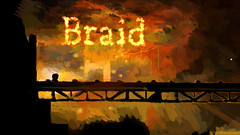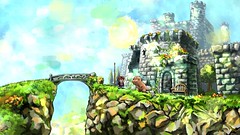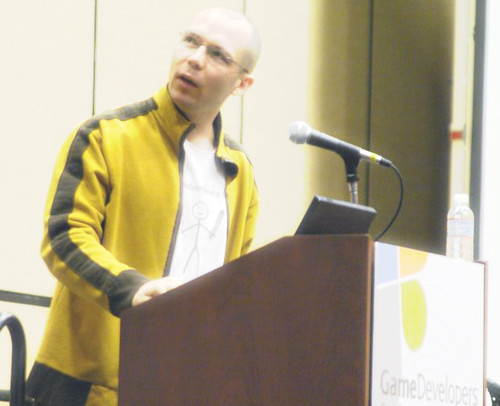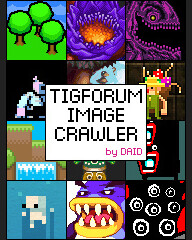TIGInterview: Jonathan Blow
By: Leigh Christian Ashton
On: May 11th, 2009
I’d find it hard to believe anyone visiting these pages would need an introduction to Jonathan Blow, the amazingly talented game developer/guru seems to be everywhere at the moment, his game Braid being the darling hit on Xbox Live and having recently stormed onto the PC. I took the opportunity to fire some questions over so that he could pour some honey into my ears in reply (except, being an email interview, i guess it would be my eyes? and metaphorically at that?)
Anyway, without further ado, please read on..
Leigh: Jon, hello, thanks for taking the time to answer some of my questions. Could you please introduce yourself to the crowd?
Jon: Hi, my name is Jonathan Blow. I make games! I started out in games as mainly a technical guy, but recently I have been thinking ever-more about design, and on Braid I cared much more about the game design than the technical parts.
Leigh: You’ve just released Braid on multiple distribution platforms for the PC. With a longer than average development cycle for an independent developer, you must be pleased to see it finally go out the door?
Jon: It’s nice to have the game (mostly) done. There’s still the Mac port to watch over (though I am not handling the porting of that; Hothead Games is doing it), and the question of whether Braid is going to appear on any other consoles.
Leigh: Though originally developed for the PC, you released Braid first for the Xbox 360, Did this add substantial development time to the project? How complete was the PC version prior to the switch?
Jon: The Xbox 360 version definitely did add substantial development time to the project; there’s a lot of work to do for a platform like that. However, there wasn’t really a “switch”. It was up in the air which platform would be the first release, and eventually I decided on the Xbox 360. At that time the game was pretty much done from end to end, in terms of the number of levels and the puzzle design, though that had been true for a while (the IGF award-winning submission of Braid was the complete game, and that was back in December 2005; I signed with Microsoft in mid-2007). Even after the Xbox 360 was chosen as the target platform, there was a lot of work left to do on the basic game — I was still working heavily with David Hellman to determine how the game would look, and to produce the graphics and do the programming required to place them in the levels.
Leigh: Has the PC version benefited in any substantial way from the inclusion of a port to the 360?

Jon: It was nice to have a solid, well-defined platform to focus on while finishing the actual game part of the game, before having to worry about all the programming involved in dealing with PC compatibility issues. So I think the game benefited some from my being able to focus on a single tangible experience that the user would have.
Leigh: Braid feels like a game you want people to become emotionally engaged in more than just played, do you feel its important for games to be more than a test of skill or memory?
Jon: I wouldn’t ever claim that all games should be a certain way. There are a lot of possibilities for where games can go, and it’s probably a good idea to explore them all.
Leigh: Is it better to elicit emotional responses through gameplay or narrative? Does it matter if either is well done?
Jon: I gave a whole lecture recently about why I think story-based games have a lot of problems. Here’s the link: http://braid-game.com/news/?p=385 . If a designer is thinking about making something emotional through narrative, I would encourage some kind of narrative structure that is not trying to be a conventional linear story. Of course the gameplay route is also full of untapped potential, but there are reasons why it can be difficult to make headway there, which I discuss in the lecture.
Leigh: You spend a lot of time making prototypes of different gameplay mechanics, is it as much about implementation as innovation?
Jon: If you mean about enjoying the craft of programming… I have to admit I don’t really enjoy programming very much any more, because in order to get things done I have adopted a style of programming that makes it as simple as I can, so that it is just easy to get things done, and it only requires time and a lot of typing. So I am not really solving any difficult puzzles or challenges when programming, as beginning programmers might. On the plus side, this means I can program in a relatively efficient manner; on the minus side, it’s a less-engaging activity. I make up for that on the design side; whether I am making a prototype or a full game, it’s about exploring some interesting space of ideas. Programming is now just the implementation detail of how I do that exploration.
It’s not really about innovation so much as exploring interestingness. There is this idea of chasing innovation in game design that I used to be a big proponent of, but that I now suspect is a little bit misdirected.
Leigh: You’re not afraid to throw away cool ideas when they don’t feel right at the prototype stage. A lot of other developers might not be so detached from their ideas.
Jon: These things are true! I try to encourage people to be willing to delete stuff that is mediocre or just kind of good – or at least put that stuff in a closet for some future day – so that they can focus on the stuff that is great. Many people don’t think that way, though. When it is so hard to get anything substantial done, you just don’t want to throw away any of your hard-earned progress. One solution is to make it easier to make progress.
Leigh: Should all games try to innovate? Is re-interpreting the implementation of an innovative new mechanic as valid? I ask because it’s worth noting a number of games have time-play in them now.

Jon: I think gameplay innovation can result in things that are interesting, but at the same time it doesn’t automatically result in something that is deep — often it’s a gimmick. I am interested in deepness and richness of game design. You can get that with deliberate innovation or without; I think the issues are orthogonal. At the same time, I think if a designer is working on something he really cares about, and is really exploring some ideas in his own style, bringing his own particular insight to the table, then he will automatically come up with something different than most other games; furthermore, this will be a deeper, more-compelling kind of innovation.
That’s what I meant earlier about the deliberate chasing of innovation being a somewhat misguided pursuit. Yes, you can make neat stuff that way, but the innovation will come to you for free if you do things a different way, and you are likely to end up with a different result.
To take a specific example, Braid would be kind of interesting if it were a game with gimmicky time-manipulation mechanics, but I think that many players find it more interesting than that because it is built on a core philosophy and a thorough exploration of a certain set of ideas. Players can feel that, even if they can’t say what the philosophy is or explain the ideas being explored.
Leigh: With talk of innovation and emotional investment, there are still some very conventional design choices like jumping on the head of monsters, moving platforms, ladders, levers and collectables. Is this saying fundamentally there’s not so much wrong with games as they are, they just missing those one or two extra ideas to make them more worthwhile?
Jon: I did these things because they were right for Braid; for another game, I would do something completely different. I don’t think you should take the presence of these elements in Braid as any kind of statement about whether anything is or isn’t wrong with games as they are.
Leigh: Can you talk a little about what inspires your design choices?
Jon: I’d like to, but this is a very broad question. Hopefully in the previous answers I have at least given a little bit of information about this.
Leigh: What about games that you enjoy, are there any real favourites you can say have had an impact on you in some way?
Jon: There are a lot of games that I’ve played that I enjoyed and that influenced the design of Braid. Probably too many to name. Games that currently spring to mind as “favorites” are very different and probably didn’t influence Braid too much (examples: Netrek, and Counter-Strike sometime around the beta 4 – beta 5 timeframe).
Leigh: Since Braid is a platformer, I want to tell you my favourite platformer of all time was The New Zealand Story. Any chance of a remake with time reversal? :)
Jon: I never played The New Zealand Story! Maybe I’ll be able to check it out sometime.
Leigh: Heh, I was only joking, but have you ever wanted to remake any old favorites, felt there was an opportunity missed that you’d like to explore?
Jon: I often get the idea to remake old games, though I usually don’t do it. Actually, though, one of the earlier ideas I was playing with in Braid was that there would be secret levels with remakes of classic games, modified with the time rules of each particular world, accessible when you finished each puzzle. I had an entire remake of Mountain King in Braid at one point. I think it was better than the original Mountain King, with more-sophisticated gameplay, but it didn’t fit what Braid was becoming, so I eventually took it out.
Leigh: Thanks for your time Jon! It’s been really great to hear from you.
Jon: You’re welcome!
Jonathan Blow created Braid for the Xbox 360 and PC which is available now at various digital outlets. You can view the Braid website, Jon has a blog and he is also a workshop organizer at The Experimental Gameplay Workshop
To top it all off, he’s an indie superhero who could talk the hind legs off a donkey, bravo sir!
-
Paul Eres
-
sinoth
-
Esquar
-
AGuy
-
Jonathan Blow
-
magallanes
-
Trotim
-
Gravious
-
http://www.dyson-game.com Alex May
-
lol
-
http://www.glaielgames.com Glaiel Gamer
-
Vitae
-
Corpus
-
PHeMoX
-
falsion
-
Jonathan Blow
-
AGuy
-
skaldicpoet9
-
Corpus
-
http://www.glaielgames.com Glaiel Gamer
-
falsion
-
falsion
-
avoidobject
-
Edmund
-
Montoli
-
http://www.glaielgames.com Glaiel Gamer
-
jim
-
Lyx
-
avoidobject
-
http://www.indiebird.com Alex Vostrov
-
Koholint
-
http://www.indiebird.com Alex Vostrov
-
Malasdair
-
avoidobject
-
skaldicpoet9
-
Lyx
-
Person what enjoys indie games
-
falsion
-
falsion
-
falsion
-
toastie
-
Lyx
-
falsion
-
falsion
-
falsion
-
Lyx
-
http://www.glaielgames.com Glaiel Gamer
-
toastie
-
http://www.indiebird.com Alex Vostrov
-
braidfan99


